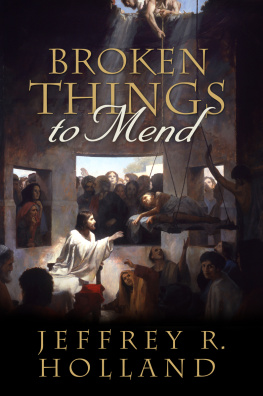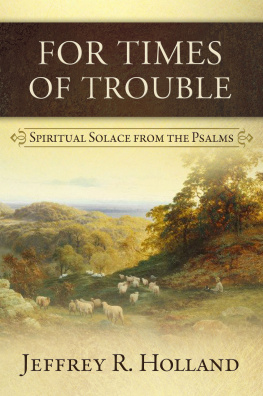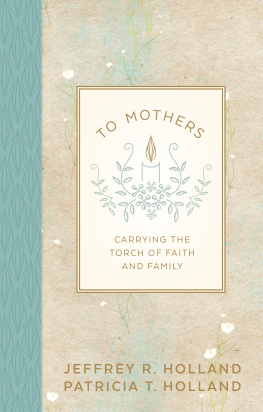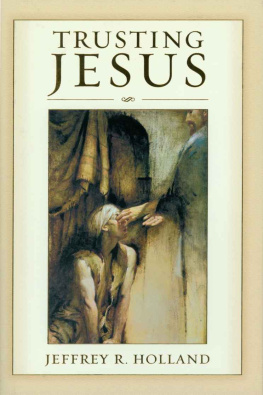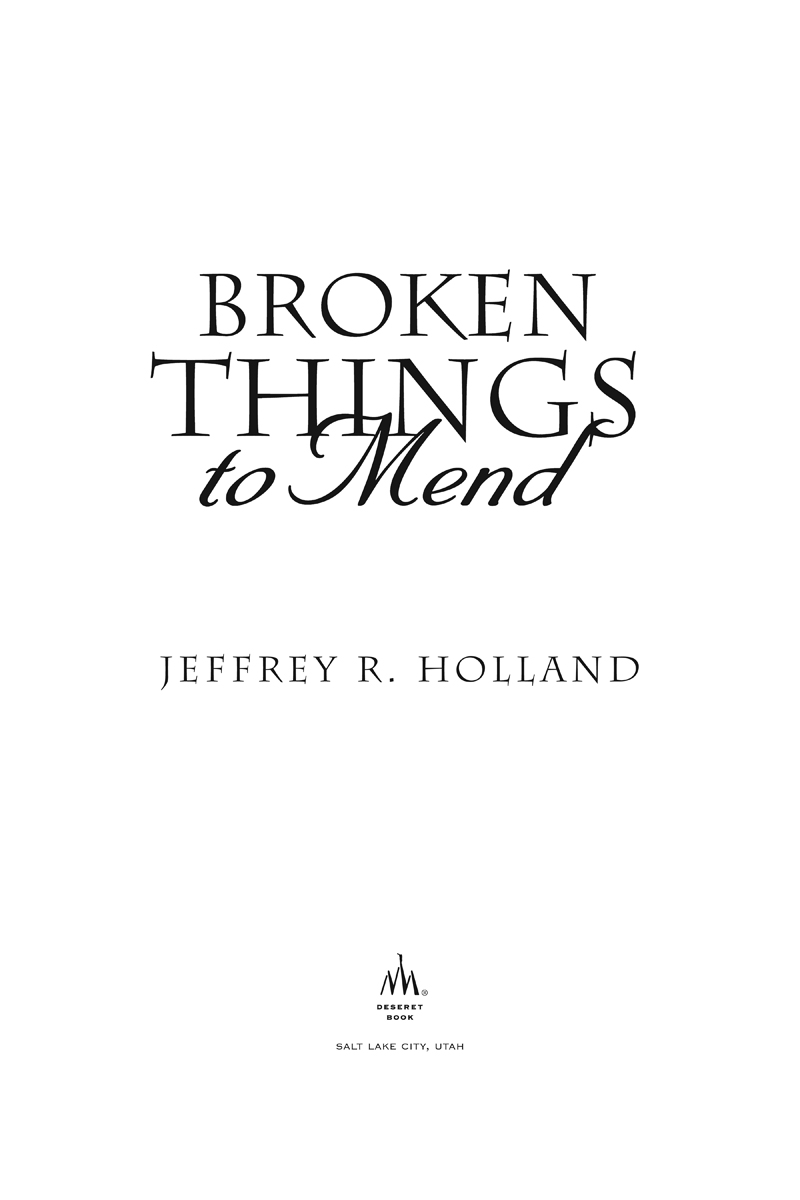2008 Jeffrey R. Holland.
All rights reserved. No part of this book may be reproduced in any form or by any means without permission in writing from the publisher, Deseret Book Company, P.O. Box 30178, Salt Lake City Utah 30178. This work is not an official publication of The Church of Jesus Christ of Latter-day Saints. The views expressed herein are the responsibility of the author and do not necessarily represent the position of the Church or of Deseret Book. Deseret Book is a registered trademark of Deseret Book Company.
Visit us at DeseretBook.com
Library of Congress Cataloging-in-Publication Data
Holland, Jeffrey R., 1940
Broken things to mend / Jeffrey R. Holland.
p. cm.
Includes bibliographical references and index.
ISBN 978-1-60641-024-0 (hardbound : alk. paper)
Church of Jesus Christ of Latter-day SaintsDoctrines. 2. Mormon
ChurchDoctrines. I. Title.
BX8635.3.H65 2008
230'.9332dc22 2008024936
Printed in the United States of America
Publishers Printing, Salt Lake City, UT
To all who feel that someoneor somethingthey love is irreparably broken or irretrievably lost.
It is not.
Strength for the Weary Soul

Chapter 1
Broken Things to Mend

The first words Jesus spoke in His majestic Sermon on the Mount were to the troubled, the discouraged and downhearted. "Blessed are the poor in spirit," He said, "for theirs is the kingdom of heaven" (Matthew 5:3). Many people are facing personal trials and family struggles, enduring conflicts fought in the lonely foxholes of the heart, trying to hold back floodwaters of despair that sometimes wash over us like a tsunami of the soul. What follows is especially for those who feel their lives are broken, seemingly beyond repair.
To all such I offer the surest and sweetest remedy that I know. It is found in the clarion call the Savior of the world Himself gave. He said it in the beginning of His ministry, and He said it in the end. He said it to believers, and He said it to those who were not so sure. He said to everyone, whatever their personal problems might be:
"Come unto me, all ye that labour and are heavy laden, and I will give you rest. Take my yoke upon you, and learn of me; for I am meek and lowly in heart: and ye shall find rest unto your souls" (Matthew 11:2829).
In this promise, that introductory phrase, "come unto me," is crucial. It is the key to the peace and rest we seek. Indeed, when the resurrected Savior gave His sermon at the temple to the Nephites in the New World, He began, "Blessed are the poor in spirit who come unto me, for theirs is the kingdom of heaven" (3 Nephi 12:3; emphasis added).
When Andrew and John first heard Christ speak, they were so moved that they followed Him as He walked away from the crowd. Sensing He was being pursued, Jesus turned and asked the two men, "What seek ye?" They answered, "Where dwellest thou?" And Christ said, "Come and see." The next day He found another disciple, Philip, and said to him, "Follow me" (see John 1:3539, 43). Just a short time later He formally called Peter and others of the new Apostles with the same spirit of invitation. Come, "follow me," He said (Matthew 4:19).
It seems clear that the essence of our duty, the fundamental requirement of our mortal life, is captured in these brief phrases from any number of scenes in the Savior's mortal ministry. He could have said to us, "Trust me, learn of me, do what I do. Then, when you walk where I am going," He says, "we can talk about where you are going, and the problems you face and the troubles you have. If you will follow me, I will lead you out of darkness," He promises. "I will give you answers to your prayers. I will give you rest to your souls."
I know of no other way for us to succeed or to be safe amid life's many pitfalls and problems. I know of no other way for us to carry our burdens or find what Jacob in the Book of Mormon called "that happiness which is prepared for the saints" (2 Nephi 9:43).
So how does one "come unto Christ" in response to this constant invitation? The scriptures give scores of examples and avenues. You are well acquainted with the most basic ones. The easiest and the earliest comes simply with the desire of our heart, the most basic form of faith that we know. "If ye can no more than desire to believe," Alma says, exercising just "a particle of faith," giving even a small place for the promises of God to find a homethat is enough to begin (see Alma 32:27; emphasis added). Just believing, just having a molecule of faithsimply hoping for things which are not yet seen in our lives, but which are nevertheless truly there to be bestowed (see Alma 32:21)that simple step, when focused on the Lord Jesus Christ, has ever been and always will be the first principle of His eternal gospel, the first step out of despair.
Second, we must change anything we can change that may be part of the problem. In short, we must repent, perhaps the most hopeful and encouraging word in the Christian vocabulary. We thank our Father in Heaven we are allowed to change, we thank Jesus we can change, and ultimately we do so only with their divine assistance. Certainly not everything we struggle with is a result of our actions. Often our trials result from the actions of others or just the mortal events of life. But anything we can change we should change, and we must forgive the rest. In this way our access to the Savior's Atonement becomes as unimpeded as we, with our imperfections, can make it. He will take it from there.
Third, in as many ways as possible we try to take upon us His identity, and we begin by taking upon us His name. That name is formally bestowed by covenant in the saving ordinances of the gospel. These start with baptism and conclude with temple covenants, with many others, such as partaking of the sacrament, laced throughout our lives as additional blessings and reminders. Teaching the people of his day this message, Nephi said: "Follow the Son, with full purpose of heart,... with real intent,... take upon you the name of Christ.... Do the things which I have told you I have seen that your Lord and your Redeemer [will] do" (2 Nephi 31:13, 17).
Following these most basic teachings, a splendor of connections to Christ opens up to us in multitudinous ways: prayer and fasting and meditation upon His purposes, savoring the scriptures, giving service to others, "succor[ing] the weak, lift[ing] up the hands which hang down,... strengthen[ing] the feeble knees" (D&C 81:5). Above all else, loving with "the pure love of Christ," that gift that "never faileth," that gift that "beareth all things, believeth all things, hopeth all things, [and] endureth all things" (Moroni 7:47, 46, 45). Soon, with that kind of love, we realize our days hold scores of thoroughfares leading to the Master and that every time we reach out, however feebly, for Him, we discover He has been anxiously trying to reach us. So we step, we strive, we seek, and we never yield.1
My desire is for all of usnot just those who are "poor in spirit" but all of usto have more straightforward personal experience with the Savior's example. Sometimes we seek heaven too obliquely, focusing on programs or history or the experience of others. Those are important, but not as important as personal experience, true discipleship, and the strength that comes from experiencing firsthand the majesty of His touch.

